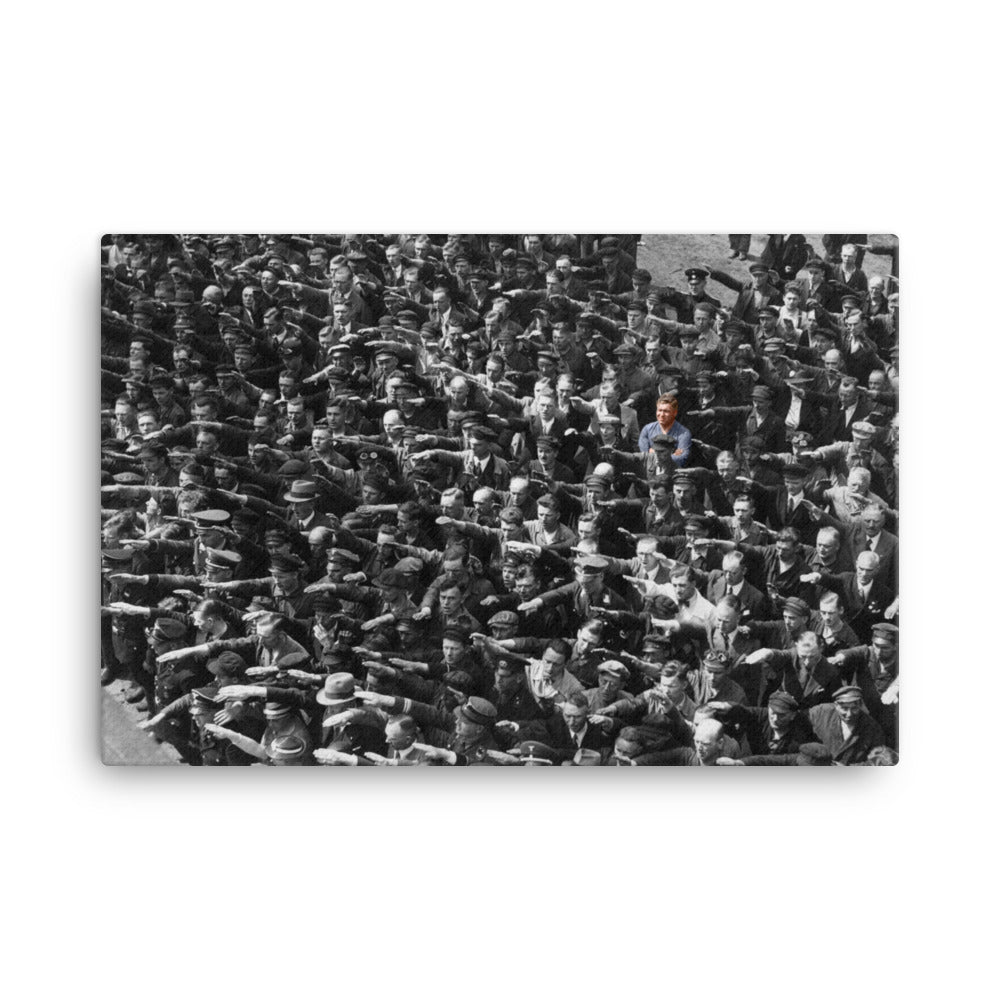





August Landmesser Canvas Wall Art
On June 13th, 1936, this hero named August Landmesser was working at the Blohm + Voss shipyard in Hamburg, Germany. When you read his story, you'll never forget him.
In the 1930s, the fascist mania for Hitler’s regime instituted a law making the infamous “sieg heil” hail victory salute mandatory for Germans.
One German named August Landmesser, seen here in this powerful photo refused to obey. His incredible story is one of great courage, sacrifice, and horrific loss in the name of love.
Landmesser joined the Nazi Party in 1931. But it was the only legal political affiliation one could have in Germany at the time, so he had little choice. In a few years' time, August met the love of his life, Irma Eckler. The only problem was that Erma was Jewish in a time when bigotry in the country was beginning to rage.
By 1935, August proposed to Irma. After the engagement was discovered by Nazi Party officials, he was expelled from the party. But that did not stop them, as they decided to file a marriage application in another city, but because of the Nuremberg Laws, the couple was denied. Undeterred by hate, and confident their love could overcome, August and Irma had their first daughter, Ingrid, in October 1935.
On June 13, 1936, Landmesser gave his defiant crossed-arm stance during Hitler’s christening of a new German navy vessel with his 9-month-old daughter and beloved Irma at home.
The Landmessers attempted to flee Germany for Denmark in 1937 after their second daughter was born. However, disaster struck when the family was captured and detained at the border. August was charged with Rassenschande or “dishonoring the race,” under the Nuremberg Laws, but was acquitted a year later. The government, however, instructed August to stop seeing his wife.
Landmesser courageously disobeyed the evil dictates of the Nazi officials and was arrested again in 1938 and sentenced to Börgermoor Penal Camp. He never saw his family again.
The Gestapo secret police arrested a pregnant Irma. She was moved around to several internment camps: Oranienburg, Lichtenburg, and Ravensbrück. She gave birth to their daughter Irene in prison.
Irma was transferred from Ravensbrück to the Bernburg death camp in 1942, where she was led to the gas chamber along with thousands of others.
The two Landmesser daughters survived the holocaust because of the love and courage of numerous people, though suffered greatly under persecution and physical abuse in orphanages. The youngest, Irene, was amazingly and courageously rescued by a woman as her mates from her orphanage were all sent to be murdered by Nazis.
August was conscripted by the Nazis and presumed dead in 1945.
August’s stance represents not only the heroism of defiance against evil but the toll that defiance can take. He and his family should always be celebrated as martyrs for love.
This canvas print has a vivid, fade-resistant print that you're bound to fall in love with.
• Acid-free, PH-neutral, poly-cotton base
• 20.5 mil (0.5 mm) thick poly-cotton blend canvas
• Canvas fabric weight: 13.9 oz/yd2(470 g/m²)
• Fade-resistant
• Hand-stretched over solid wood stretcher bars
• Matte finish coating
• 1.5″ (3.81 cm) deep
• Mounting brackets included
• Blank product in the EU sourced from Latvia
• Blank product in the US sourced from the US
Size guide
| HEIGHT (inches) | WIDTH (inches) | |
| 12″×12″ | 12 | 12 |
| 12″×16″ | 12 | 16 |
| 16″×16″ | 16 | 16 |
| 16″×20″ | 16 | 20 |
| 18″×24″ | 18 | 24 |
| 24″×36″ | 24 | 36 |
| HEIGHT (cm) | WIDTH (cm) | |
| 12″×12″ | 30.5 | 30.5 |
| 12″×16″ | 30.5 | 40.6 |
| 16″×16″ | 40.6 | 40.6 |
| 16″×20″ | 40.6 | 50.8 |
| 18″×24″ | 45.7 | 61 |
| 24″×36″ | 61 | 91.4 |
Collections: Canvas Art, Father's Day, Handmade | Made by Hand by Maniacs, Home, Home and Living, New Arrivals, Wall Art | Prints, Canvases, Flags, Signs, and Metal Art
Type: Canvas Wall Art
Category: August Landmesser, canvas, dissent













